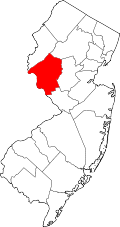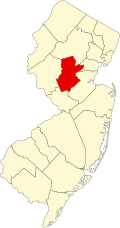Cloverhill, New Jersey | |
|---|---|
 Clover Hill Reformed Church | |
| Coordinates: 40°29′17″N74°46′56″W / 40.48806°N 74.78222°W | |
| Country | |
| State | |
| County | Hunterdon and Somerset |
| Township | East Amwell, Raritan and Hillsborough |
| Named after | Peter Clover |
| Elevation | 187 ft (57 m) |
| GNIS feature ID | 875522 [1] |
Cloverhill (or Clover Hill) is an unincorporated community located at the intersection of the boundaries of East Amwell and Raritan townships in Hunterdon County and Hillsborough Township in Somerset County, in the U.S. state of New Jersey. [2] The Clover Hill Historic District was listed on the state and national registers of historic places in 1980.






